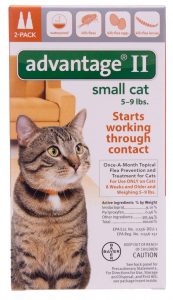My Flea and Tick Topical Doesn't Work!
My topical flea and tick prevention doesn’t seem to be working. What’s wrong? Did they change the formula? If you’re routinely providing flea and tick prevention to your pet but they still seem to be suffering from bites, there are several reasons the product may not be working.

Although it seems like a given, make sure you are applying the medication correctly. Always read the instructions and apply accordingly. With topical spot-on products, it's important that the product reaches your pet’s skin and doesn’t sit above their epidermal layer. You'll want to rub your pet's coat the wrong way so you can see skin. If the product doesn’t hit the skin, it will not be absorbed in your pet’s sebaceous glands.
That's where the flea-fighting magic happens! Make sure you are using the entire tube of medication on your pet. Don’t skimp and try to save a few dollars by splitting the product between months or between pets. There is no way to know how much of the active ingredients will be getting into your pet's skin if you try to split doses. The product will not function properly if you try to do so.
If the product does not reach your pet’s sebaceous glands, it will not work effectively. This is common in pets that have extremely dry skin or thick fur. As with humans, exfoliating your pet’s skin and removing extraneous dead skin cells will provide a clean surface for the topical. Follow the directions on your topical, but the directions on most topicals advise to make sure the coat is completely dry before applying the product.
![Photo by Jonathan Mast on Unsplash. [Flea and tick treatments not working]](https://cdn.shopify.com/s/files/1/0660/0536/9021/files/Poodle_In_Yard-300x200.jpg)
Remember that whether you use topical flea prevention or a collar, such as the Seresto Flea & Tick collar, it is extremely important that you also treat your house and yard. The Advantage Yard & Premise Spray and the Enforcer Flea Spray for Homes are just two products that can help you win the war on fleas & ticks! Insects are known for their ability to develop resistance to insecticides.
Currently, there are insects resistant to EVERY synthetic chemical insecticide used. There are many factors to developing resistance. In a population of insects, there may be a few individuals that carry the genes for resistance. These genes arise from mutations and are rare. In the natural environment, the mutant insect is typically compromised, weaker and produces fewer offspring.
Upon exposure to insecticides, insects that do not carry the resistance genes die. This allows the individuals with the resistance genes to survive and reproduce, creating more resistant insects. So with every generation, the number of resistant insects increase.
Change Is a Good Thing

Frontline® Plus for Dogs
Advantage II for Cats
To sum it up, if what you’ve been using no longer seems effective, switch to a product with a different active ingredient. For example, if you’ve been using Frontline Plus on your pet for years, and notice it isn't as effective, try switching to Advantage II.
Don’t switch to a product with the same active ingredient as what you have been using. In all likelihood, it will not be effective. If you have any questions, please feel free to call 1-800-533-3377 x381 or email rsjones@jefferspet.com me anytime! Read more about fleas here. Read more about ticks here. See all Flea & Tick Products for Dogs. See all Flea & Tick Products for Cats.
Information in this blog is meant to be helpful and/or educational. It should in no way supersede, challenge or supplant the diagnosis, treatment or advice of a licensed veterinarian.
Renee Jones, CPDT-KSA, is a certified professional dog trainer, having received instruction from canine behaviorist Dr. Pamela Reid, plus nationally acclaimed trainers: Patricia McConnell, Pia Silvani, and Jean Donaldson, to name a few. She is a member of the Association of Professional Dog Trainers (APDT) and the International Association of Animal Behavior Consultants (IAABC). She serves as a Pet Marketing and Canine Specialist for JeffersPet and JeffersPet.com. Questions about this article, training, or non-emergent health concerns are welcome. Renee can be reached most days from 9am – 5pm Central Time (Mon-Fri) at 1-800-JEFFERS (533-3377) ext 381 or by email rsjones@jefferspet.com.

